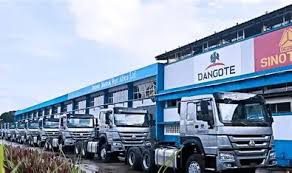In a decisive move to enhance road safety and eliminate auto crashes, Dangote Cement Plc, in collaboration with the Federal Road Safety Corps (FRSC), has introduced stricter entry requirements and robust training protocols at its Dangote Articulated Trucks Drivers Training School (DATDTS). This initiative, centered at the company’s Obajana plant in Kogi State, underscores Dangote Cement’s unwavering commitment to achieving zero road crashes through rigorous driver screening, advanced technology, and comprehensive safety measures. The program not only aims to improve the safety standards of its fleet but also sets a benchmark for the transportation industry in Nigeria, aligning with global best practices in road safety and driver management.
A Zero-Tolerance Approach to Road Safety
Dangote Cement Plc, one of Nigeria’s leading industrial conglomerates, has long prioritized safety in its operations, particularly in its extensive transport division, which manages thousands of trucks delivering cement across the country. The company’s zero-tolerance policy for auto crashes reflects its recognition of the devastating consequences of road accidents, which claim numerous lives and cause significant economic losses in Nigeria annually. To address this, Dangote Cement has implemented a multi-faceted strategy that combines stringent driver recruitment criteria, continuous training, advanced monitoring systems, and infrastructure investments to ensure that its drivers operate under the highest safety standards.
Speaking to journalists at the Obajana plant, Mr. Murilo Silva, Head of Transport at Dangote Cement Plc, outlined the company’s comprehensive approach to promoting safe driving. “As part of our efforts to promote safe driving and achieve zero road crashes, we have begun installing cameras across our fleet of thousands of Compressed Natural Gas (CNG) trucks,” he said. These cameras serve as a critical tool for monitoring driver behavior, ensuring compliance with safety protocols, and identifying areas for improvement. By leveraging technology, Dangote Cement is not only enhancing accountability but also fostering a culture of responsibility among its drivers.
Stricter Entry Requirements for Drivers
A cornerstone of Dangote Cement’s safety strategy is the implementation of stricter entry requirements for aspiring truck drivers. According to Mr. Silva, applicants must meet a rigorous set of criteria to be considered for employment. These include being at least 23 years of age, possessing a minimum of five years of relevant driving experience, and holding a valid Class G driver’s license, which is specifically required for operating articulated trucks. These requirements ensure that only experienced and qualified individuals are entrusted with the responsibility of driving Dangote’s heavy-duty vehicles.
In addition to these baseline criteria, applicants must undergo a thorough examination and screening process. This includes comprehensive medical evaluations to assess physical fitness, vision screening to ensure adequate eyesight, and tests for blood pressure, body mass index (BMI), and random blood sugar (RBS). Drug and alcohol testing is also mandatory, reflecting the company’s zero-tolerance stance on substance abuse, which is a leading cause of road accidents. Furthermore, applicants must have a clean criminal record with no pending legal cases, ensuring that only individuals with impeccable character are recruited.
Mr. Silva emphasized that these requirements are enshrined in the company’s Policy on Drivers Employment Processes, which outlines the criteria for engaging new drivers at the DATDTS. “The policy ensures that we maintain a high standard of professionalism and safety across our transport operations,” he said. By setting such stringent standards, Dangote Cement is not only safeguarding its operations but also contributing to the broader goal of reducing road accidents in Nigeria.
Comprehensive Training at DATDTS
The Dangote Articulated Trucks Drivers Training School (DATDTS), located at the Obajana plant, is at the heart of the company’s efforts to build a cadre of highly skilled and safety-conscious drivers. Mr. Daniel Marcus Akuso, Manager of DATDTS, described the institution as the first of its kind in Nigeria, offering a wide range of courses designed to equip drivers with the knowledge and skills needed to operate safely and efficiently. The school operates in collaboration with the FRSC, which conducts regular certification and recertification training to ensure that drivers remain up to date with the latest safety standards and regulations.
The curriculum at DATDTS is comprehensive, covering both technical and non-technical subjects. Courses include Civic Education, English, Mathematics, Defensive Driving, Truck Handling, Maintenance Technology, DCT Administration Procedures, Root Cause Analysis, Health and Safety, and Road Signs and Codes. These programs are designed to address the multifaceted challenges of driving heavy-duty trucks, from navigating complex road networks to maintaining vehicles and responding to emergencies. Defensive driving, in particular, is a key focus, teaching drivers how to anticipate and avoid potential hazards on the road.
Mr. Akuso noted that participation in the monthly training program has increased significantly, with a 60% rise in attendance this year. This reflects the growing awareness among drivers of the importance of continuous learning and professional development. Additionally, drug and alcohol testing has increased by 40%, ensuring that drivers remain fit and alert at all times. Pre-trip inspections, another critical component of the safety protocol, have seen a remarkable 74% increase, demonstrating the company’s commitment to ensuring that vehicles are roadworthy before embarking on journeys.
Advanced Infrastructure and Monitoring Systems
To complement its training and screening efforts, Dangote Cement has invested heavily in infrastructure and technology to enhance road safety. Mr. Hemant Rana, Divisional Head of Transport at the Obajana plant, highlighted the establishment of a multi-million-naira Pre-Trip Inspection Bay, staffed with engineers and mechanics who conduct thorough checks on trucks before they depart. This facility ensures that vehicles are in optimal condition, reducing the risk of mechanical failures that could lead to accidents.
In addition to the inspection bay, the company has built a Drivers’ Rest House, providing a comfortable space for drivers to rest after long trips and before embarking on new ones. Adequate rest is critical for maintaining driver alertness and preventing fatigue-related accidents, which are a major cause of road crashes. By prioritizing driver well-being, Dangote Cement is addressing one of the root causes of accidents and demonstrating its commitment to the holistic welfare of its workforce.
The company has also developed a sophisticated monitoring system to track driver behavior and performance. Mr. Rana explained that the Drivers Help Desk Units and the Control Department work in tandem to monitor drivers during trips, providing real-time support and feedback. The monitoring system includes data on speed, route adherence, and compliance with safety protocols, allowing the company to identify and address any issues promptly. This proactive approach ensures that drivers operate safely and responsibly, even in challenging conditions.
Health, Safety, and Environment (HSE) Protocols
Dangote Cement’s commitment to safety extends beyond driver training and vehicle maintenance to encompass a robust Health, Safety, and Environment (HSE) framework. Mr. Silva noted that the company has a dedicated HSE department that conducts comprehensive assessments to ensure that drivers are fit for duty. This includes regular drug and alcohol tests, blood pressure checks, and other health screenings to confirm that drivers are physically and mentally capable of operating trucks safely.
The HSE protocols are designed to create a culture of safety that permeates all aspects of the company’s transport operations. By prioritizing driver health and well-being, Dangote Cement is reducing the risk of accidents caused by medical issues or impaired judgment. The department also plays a critical role in educating drivers about the importance of maintaining a healthy lifestyle, including proper nutrition, exercise, and stress management.
Intensive Screening for Driver Fitness
The Group Managing Director of Dangote Cement Plc, Mr. Arvind Pathak, emphasized the importance of intensive screening to ensure driver fitness. Speaking to journalists in Lagos, he revealed that no fewer than 1,500 truck drivers have undergone rigorous screening exercises to assess their mental, psychological, and physical fitness for safe driving. These screenings are now mandatory for all drivers, reflecting the company’s response to the challenging road conditions across Nigeria, where factors such as poor infrastructure, heavy traffic, and erratic driving behavior contribute to high accident rates.
Mr. Pathak outlined the components of the screening process, which include a valid Class G driver’s license, background verification of both the driver and their guarantors, and comprehensive medical evaluations. The medical tests cover vision screening, blood pressure checks, BMI, random blood sugar tests, and drug and alcohol testing. These measures ensure that only drivers who meet the highest standards of fitness and professionalism are allowed to operate Dangote Cement’s trucks.
The screening process is not a one-time exercise but part of an ongoing commitment to driver safety. Regular recertification and health checks ensure that drivers remain fit for duty throughout their tenure with the company. This continuous evaluation process is critical for maintaining the high safety standards that Dangote Cement has set for itself.
Collaboration with FRSC and Industry Leadership
The partnership with the FRSC is a key pillar of Dangote Cement’s road safety strategy. By working closely with the FRSC, the company ensures that its training programs and safety protocols align with national regulations and best practices. The FRSC’s involvement in certification and recertification training at DATDTS enhances the credibility and effectiveness of the program, ensuring that drivers are well-versed in road safety laws and regulations.
This collaboration also positions Dangote Cement as a leader in the transportation industry, setting an example for other companies to follow. By investing in driver training, advanced technology, and infrastructure, Dangote Cement is demonstrating that road safety is not just a regulatory requirement but a moral and economic imperative. The company’s efforts are likely to have a ripple effect, encouraging other organizations to adopt similar measures and contributing to a broader culture of safety on Nigerian roads.
Impact and Future Prospects
The impact of Dangote Cement’s road safety initiatives is already evident. The 60% increase in training participation, 40% rise in drug and alcohol testing, and 74% surge in pre-trip inspections reflect a significant shift toward a safety-first culture within the company’s transport division. These measures are expected to reduce the incidence of auto crashes, protect lives, and enhance the efficiency of Dangote Cement’s operations.
Looking ahead, the company plans to expand its safety initiatives, including the installation of additional cameras and monitoring systems across its fleet. The continued development of DATDTS as a center of excellence for driver training will ensure that the next generation of truck drivers is equipped with the skills and knowledge needed to navigate Nigeria’s challenging roads safely. Furthermore, the company’s investment in CNG trucks aligns with its commitment to environmental sustainability, reducing carbon emissions and promoting cleaner transportation.
Challenges and Opportunities
While Dangote Cement’s efforts are commendable, several challenges remain. Nigeria’s road infrastructure, characterized by potholes, narrow lanes, and inadequate signage, poses a significant risk to drivers, even those who are well-trained and vigilant. Addressing these systemic issues will require collaboration between the private sector, government agencies, and other stakeholders to improve road conditions and enforce traffic regulations.
Another challenge is the need to sustain the momentum of the safety initiatives. Continuous investment in training, technology, and infrastructure is essential to maintain the high standards set by Dangote Cement. The company must also ensure that its safety culture permeates all levels of its transport operations, from management to drivers, to achieve lasting results.
Despite these challenges, the opportunities are immense. By leading the way in road safety, Dangote Cement can inspire other companies to adopt similar measures, contributing to a national reduction in road accidents. The company’s focus on driver well-being, environmental sustainability, and technological innovation positions it as a trailblazer in the industry, with the potential to set new standards for transportation safety in Nigeria and beyond.
Conclusion
Dangote Cement Plc’s comprehensive approach to road safety, exemplified by the stricter entry requirements, advanced training programs, and robust monitoring systems at the Dangote Articulated Trucks Drivers Training School, represents a transformative step toward achieving zero auto crashes. By collaborating with the FRSC, investing in infrastructure, and prioritizing driver health and professionalism, the company is not only safeguarding its operations but also contributing to a safer and more sustainable transportation ecosystem in Nigeria.
The initiatives undertaken at the Obajana plant, from the Pre-Trip Inspection Bay to the Drivers’ Rest House, demonstrate Dangote Cement’s commitment to addressing the root causes of road accidents. The intensive screening of 1,500 drivers, coupled with the integration of technology such as cameras and monitoring systems, ensures that safety remains at the forefront of the company’s transport operations. As Dangote Cement continues to lead by example, its efforts are poised to have a lasting impact, not only on its drivers and operations but also on the broader goal of making Nigeria’s roads safer for all.







